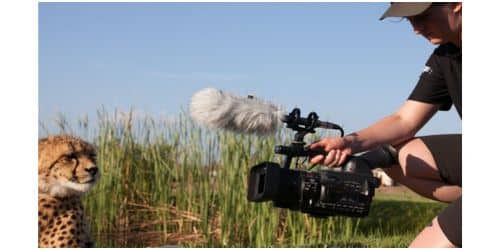Camera operators are in charge of where the cameras are placed, how the lights are set up, and other technical parts of making a movie or video. They collaborate with cinematographers to find the best images for each scene, ensuring that everything is in focus and that no detail is left out of frame. When it comes to camera settings, lighting, and placement, camera operators must be able to make decisions quickly. During shooting, they must also be able to work directly with directors and actors in order to get the best results. Furthermore, we will talk about a camera operator, their salary range, their job description, how to become a camera operator, and sports camera operators.
Camera Operator
A camera operator is in charge of operating a camera during the production of a film, television show, or video. They work directly with directors, cinematographers, and other members of the production team to get the shots and views needed for a scene. Camera operators know how to use many different kinds of cameras and tools, such as digital cameras, film cameras, and special rigs like cranes and stabilizers.
A camera operator’s job is to perform precise camera movements to produce the required visual composition, such as panning, tilting, tracking, or zooming. To successfully show what the director wants, they must have a good eye for details and know how to use the camera. Camera operators also work with the director to make sure that each shot has the right lighting and camera settings. They may also have to set up and adjust camera tools, deal with technical problems, and get high-quality footage according to production standards.
Read Also: GPS TRACKING SOFTWARE: Best GPS Tracking Software 2023
Camera Operator Salary
As of June 26, 2023, the median salary for a Camera Operator, television operator, and Motion picture producer in the United States is $88,079. However, the range of salaries is usually between $73,195 and $110,036. Salary ranges can vary greatly depending on a variety of things, including education, certifications, extra skills, and how many years you have worked in your field.
What are the Top 10 Highest Cities for Entry Level Camera Operator Jobs?
We’ve found 10 cities where an entry-level Camera Operator’s median salary is higher than the national average. The first place on the list is New York City; Berkeley, CA, and Renton, WA, which are in second and third place, are not far behind. Renton, WA, is $8,510 (17.7%) higher than the national average, and New York City, NY, is another $10,465 (21.8%) higher than the average of $48,039.
Since the average salaries in these 10 cities are better than the national average, it seems like an entry-level camera operator could make a lot of money by moving to a different city.
Lastly, another thing to think about is that the average salary of a camera operator in these top ten places doesn’t change much from New York City, NY, to Wausau, WI (only 6%). This shows that there isn’t much room for wage growth. When thinking about location and salary for an entry-level operator job, the chance of a lower cost of living may be the best thing to consider.
What are the Top 5 Best Paying Related Entry Level Camera Operator Jobs in the U.S.?
We looked at some jobs that are similar to camera operator jobs and found that security technician jobs pay more on average than camera operator jobs.
The average starting salary for a camera operator is $48,039. The starting salary for a security technician is $8,786, which is 18.3% more than that. If you have the right skills, you might be able to make more money as a security technician than as a camera operator.
Read Also: SURVEILLANCE SYSTEM: Best Options in 2023 & Buying Guide
How to Become Camera Operator
Here’s how you can become a camera operator:
#1. Earn a degree
If you want to become a camera operator, you must enroll in a bachelor’s degree program at a college or university that has received official recognition from the government. Since a lot of camera operator jobs are in the film and TV industries, most people who want to be camera operators major in film production or photography to make sure they learn the skills and use the right tools for their jobs. You might, however, take a similar major, such as photography or video production, which can teach many of the same concepts. A bachelor’s degree will help you start your job as a cameraman by giving you the basic skills you need to do well.
#2. Complete an internship
Apply for a job as a camera operator and get work experience. Most operators try to get jobs with companies that make movies or TV shows or with news networks. This helps people who want to become one learn about their jobs by watching professionals do their jobs and helping them with their cameras and tools. Some schools have placement programs that help students find internships they might be interested in. You can also do research online or contact companies you want to work for to find internships.
A camera operator internship can help you get ready for a job in the field by teaching you about the rules of the industry and giving you the chance to meet other professionals with whom you might want to work in the future.
#3. Apply for Jobs as a Camera Operator
Look for a job as a skilled camera operator. You could apply for jobs at the place where you did your internship since you probably have a general idea of how they do things. But you can also look for work as a camera operator at film or TV production companies, news networks, sports and events companies, and more. Before you look for specific jobs, it can be valuable to know what field you want to work in. Perhaps this will affect where you look for jobs.
Networking can also help you during this step. You can reach out to professionals you met during your schooling and internship who are familiar with your skills and work ethic. This may improve your chances of getting recruited, especially if any of your connections are aware of employment openings at their company or other companies they know.
Read Also: VIDEO CONTENT: Meaning, Ideas, Strategy, Marketing & Management
Camera Operator Job Description
When recording live action for television, movies, advertisements, and other forms of visual broadcasting, cinematographers make use of a wide variety of technical instruments. These tools include single and multiple portable cameras, remote-control and electronic cameras, cranes, and mobile mountings. The following is the job description for a camera operator:
#1. Duties
- Selecting, assembling, and arranging the necessary equipment.
- Working with the artistic staff and production staff to agree on how to shoot scenes.
- Planning, arranging, and practicing scenes.
- Following camera scripts.
- Artistically framing and recording the action.
- Following directions quickly.
- Working with the people in charge of lights and technical stuff.
- Assisting and working alongside other camera operators.
The job can be physically demanding and exhausting, requiring frequent travel between places as well as lengthy and unpredictable working hours.
#2. Graduate Salaries
Many camera operators work for themselves and receive day payments as opposed to annual salaries. The Broadcasting, Entertainment, Cinematography, and Theatre Union (Bectu), which represents camera operators, says that they should be paid between £400 and £600 a day, depending on the type of project they are working on.
#3. Typical Employers of Camera Operators
- TV stations and cable businesses.
- Video production companies.
- Film companies.
- Sports clubs, such as football teams.
- Online broadcasting.
Camera operators often work on an independent or contract basis because of the way film work is set up. TV is more likely to give longer-term jobs, but these jobs are often only for a certain amount of time. Some get their jobs through companies that help them find work.
There are job boards where people can look for work. But many jobs aren’t officially posted and are filled through word of mouth, so you’ll have to be ready to network and send out hopeful applications.
#4. Qualifications and Training Required
There are ways for both college graduates and high school dropouts to work with cameras. Practical skills, enthusiasm, and relevant experience are generally more important than academic qualifications, but a degree in television, film, photography, media studies, or Performing arts may be helpful in the job description of a camera operator. It’s more important to show that you’re interested in the job and to show, through a show clip, that you know what you’re doing both in theory and in practice. You can get more experience by making your own online material, job shadowing, working for yourself, or doing volunteer work for student groups or charities.
#5. Key Skills for Camera Operators
- Physical health and stamina, such as good eyesight and hearing.
- Excellent listening skills.
- The ability to stay focused for a long time.
- Good communication skills, particularly listening abilities.
- If you work for yourself, you need business skills.
- Being able to make connections.
- Teamworking.
- Willingness to take instructions.
- Patience and grit.
Sports Camera Operator
A sports camera operator runs cameras and other filming tools at sporting events for TV networks or sports teams. They may use a portable camera to capture close-up shots of the action and interviews during a game or a stationary camera to record commentary in a station studio. They get instructions from the show director about what shots to take and where to put their attention and camera.
What Does a Sports Camera Operator Do?
Here are some of the things that a sports camera operator might do every day:
- Set up the tools and make sure they all work.
- Select the most appropriate equipment and angles.
- Attend pre-production talks before big events
- Produce any previously recorded parts
- Take wide-angle pictures of the whole field or court. Get close-up pictures of players or the game in motion.
- Create a script detailing the game’s shots that should be recorded.
- Take charge of robot and drone cameras.
- Use both fixed and portable digital cameras
- Make immediate coverage adjustments by speaking with the director.
- Use tools for broadcasting to move the camera.
Benefits of Becoming a Sports Camera Operator
The following are the benefits of this job:
#1. Attend Games and Experience Significant Sports Moments
You can get paid to go to sports games and watch every play as a camera operator. You can record last-minute goals and amazing sports feats that will be shown over and over again and remembered for years. If you choose to work as a freelance operator, you can create your own schedule, covering your favorite teams on a regular basis or generating a varied schedule.
#2. Fast-Paced Work
The setting of sports broadcasting is fast-paced, with quick changes from one point of view or commentator to another. Camera operators must be prepared for changes in their broadcast director’s instructions or for unanticipated situations Broadcasting is exciting, but it takes constant attention and accuracy.
#3. Travel
As part of this job, you might have to go to other towns or countries for games or tournaments. When the camera operator works for a big network, they might have to travel to cover the Olympics or other foreign events. There may be contracts for independent sports camera operators to cover foreign teams.
What Is Another Name for a Camera Operator?
On a movie set, the cinematographer is the person in charge of the camera. The cinematographer’s duties may include shot planning, lighting, and camera operation.
What Is the Training of a Camera Operator?
Most editors and cinematographers need a bachelor’s degree in film or broadcasting, such as communications. Many colleges have classes on how to use video editing tools or how to make movies. Coursework includes both learning about film theory and getting hands-on training.
Is a Camera Operator Technical or Creative?
As a TV camera operator, you’ll make use of digital, electronic, and film cameras to get the shots you need by combining creative visual skills with difficult technology.
What Is Camera Quality Called?
The resolution, defined in pixels, is the camera’s ability to capture detail. A camera with more pixels may capture more detail and take larger photos without blurring or appearing “grainy.”
What Are the 5 Important Parts of Camera?
All cameras have five main parts: the body, the lens, the sensor, the shutter, and the aperture. All of these are the most important parts of any camera. Without them, you wouldn’t be able to take photos or change how bright your lighting is.






